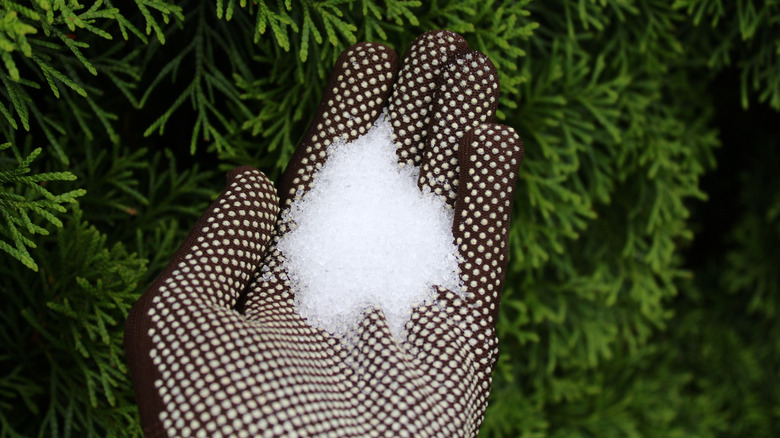The Bathroom Staple That'll Keep Hungry Groundhogs Out Of Your Yard & Garden
Hungry groundhogs can be a pain if you have a vegetable garden or fruit trees. They will eat your harvest before you get a chance to pull up a single vegetable and then dig holes through your beds for good measure. And, they eat a lot. These critters can eat up to a pound a day, so they will treat your garden rows like a buffet line. If you're tired of your hard work being stolen by hungry groundhogs, then you'll be happy to learn you can repel them with some Epsom salt. The same bath staple you use to unwind after a long day can also help you solve this pest problem in your yard.
If you don't have a jar handy in the bathroom, it's still an affordable hack since the salts are budget-friendly and easily available. It's also a humane way to keep critters from your yard, ensuring you don't harm them or any of the other wildlife that frequents your garden. If you're ready to banish your pesky groundhogs for good, here is how to use Epsom salt to do so.
How to use Epsom salt to deter groundhogs
To make groundhogs leave your vegetable patches alone, simply pour Epsom salt around the border of your crops. But you don't have to stop there. If they have burrowed holes in your lawn, pour it around the entryways and in the tunnels to ruin their lodging and make them want to move. If they're gnawing on your tree bark, sprinkle a handful of salt around the tree and anywhere else you see critter activity.
This hack works due to the salt's taste. Since groundhogs are ferocious eaters, they will likely eat some of the salt, and the saline taste will knock them back a step or two. If they eat the salt enough times, they will see your yard as a difficult place to find food and move on somewhere easier. However, you will need to keep reapplying for this to work. Specifically, you will need to do so whenever it rains, you water your lawn or garden patches, or when you see bald spots after the critters ate some.
One caveat to keep in mind when using this hack is that too much salt in the soil can potentially be harmful, specifically if there is too much magnesium in your soil. Epsom salt is partially made with magnesium sulfate, and adding too much to the ground can cause your plants to have a difficult time absorbing calcium, which is necessary to carry water through the plant and build strong cell walls.

